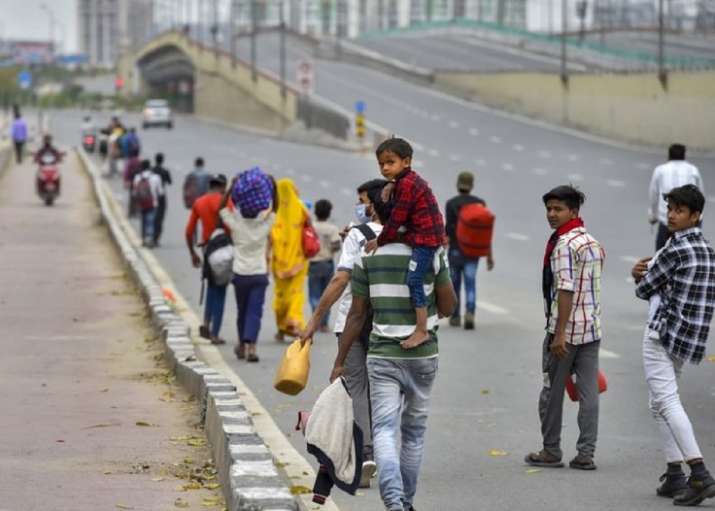
Migrants in 'no man's land' need free talk time. Is the government listening?

At a time when the chorus to help migrant workers reach their home states is growing louder, the workers have raised a pertinent query – would the government waive off their cell phone bills. Also, would the government consider a scheme, like a Pradhan Mantri Free Talk Time and Internet Yojna to enable all migrant labourers and those below the poverty line to access the internet or make calls?
The issue assumes significance as thousands of migrant workers have been hitting the roads in a desperate bid to reach their home states after the COVID-19 lockdown deprived them of jobs and livelihoods.
The daily wagers – either currently stranded without work or are in transit, rely on cell phones to stay connected with family and friends elsewhere, make online payments or to stay abreast of the situation. Most of them use feature phones and are mostly pre-paid customers.
Related news: Migrants in Delhi struggle to survive, sell phones, pawn Aadhar cards
Jan Sahas, a non-profit organisation, reported that 2,000 of the 12,000-odd migrant workers who are homebound, during calls to their toll-free number, sought help to recharge their phones.
“We need immediate help to ensure that our mobiles are working and we can make calls,” said one of the migrant workers stranded on the road.
“Our pre-paid amount is over and we do not have money to recharge our phones,” said another.
Jan Sahas is tracking those who are on reverse migration from cities to their home states; and trying to provide all possible help.
The NGO, based on its interaction with the migrating workers, shared five major concerns [of migrant workers] with regard to the use of phones:
- Mobile batteries of many had gone dead and there was no way to charge
- The pre-paid balance amount was over and they had no money to recharge
- Most of the traveling migrants tried to be in a group so that they could use one mobile phone instead of many
- The migrants had no one to fall back on – they were chased by the police and encountered barricades on highways
- At this juncture, the only hope of migrants is to have their cell phones working so that they can keep their relatives updated on their movement.
And, the most important query from the migrant workers was if their talk time and internet data could be free.
A chunk of feature phone users
Ashif Shaikh of Jan Sahas Social Development Society said, “The total informal sector workforce is estimated to be about 440 million. Of this, the vulnerable informal sector workforce is estimated to be 304 million. The total number of seasonal migrants is estimated to be 55 million (but according to census data it is 15.1 million – which is outdated).”
According to government statistics, every year, more than nine million migrant workers move from rural areas to large population centres like cities, metros and towns.
Let us assume that most of the migrant workers in the informal sector use feature phones with pre-paid telecom services. (Feature phone is a mobile phone that can access the internet and store and paly music. It bus lacks the advanced functionalities of a smartphone).
Related news: How the pandemic has hit the hands that feed
In order to match the numbers on the other side, we have International Data Corporation (IDC) figures that say that as of late 2019, ‘there were about 450 million smartphone users compared to 550 million feature phone users in India. Around 40-45 per cent of feature phone users own a device costing less than ₹1,000.’
Since the informal sector is a working class and most of them float around towns, cities, metros and areas where transactions and business take place, it may not be out of the way to assume that all of informal sector including migrant workers would be a subset of the 550 million feature phone users.
Why govt should take note now
Considering that more than half the Indian population relies on feature phones and pre-paid connectivity, and the fact that they have no means to pay for being connected now, there has been an increased demand that the government comes forward and considers communication a basic necessity and declare complete free access to telecom and data for all those who are Below Poverty Line (BPL). This is where a scheme, like the above-said Pradhan Mantri Free Talk Time and Internet Yojna, could be announced. The beneficiaries of ration, MNREGA as well as workers – migrants, daily wagers and those part of the informal sectors – should be brought under its ambit. The scheme could be applicable for six-12 months only.
The payment could be compensated through USOF (Universal Service Obligation Fund). However, the losses on telecom prices can easily be achieved through all online services that would continue to boost the usage of online talk time, analog time as well as data usage.
Related news: 7 migrants killed in separate accidents in North India since Monday
Just to prove the point, here’s the example of a ‘soochnapreneur’ (information entrepreneur) based in a village in Alwar, Rajasthan. He earns through providing digital services to the villagers and provides door-to-door banking services including withdrawals in the entire village. His status of being a banking correspondent has paid off and has been a boon for people during the lockdown when the local bank too is off limits.


